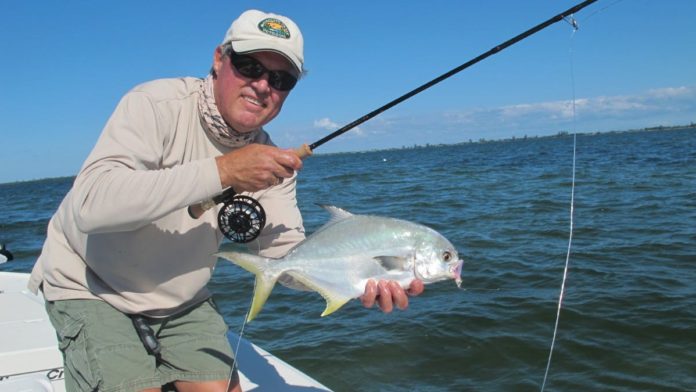Indian Riverkeeper Capt. Mike Conner will step down in June after more than two years defending the Indian River Lagoon and raising awareness of the plights facing one of North America’s most biodiverse estuaries.
Conner, 65, is the lagoon’s fourth “keeper” since the nonprofit was founded on the Treasure Coast in 2002. He replaced Marty Baum in 2019, who was at the helm for roughly seven years.
After recently losing his father and stepmother just 10 days apart, Conner said it’s time for a change for him and his wife, Michelle. The couple is planning a move to the mountains of Hiawassee, Georgia, where they hope to continue environmental advocacy.
Conner’s resignation will be effective June 1, he told TCPalm. The board is meeting virtually Tuesday night to name his successor as executive director.
“I tried to excite people: I tried to get people to become soldiers in an army, battling to reverse the damage here in the lagoon and do something about our water,” Conner said Wednesday. “I lived it day and night. I woke up to it. I went to sleep with it.”
‘Look at the water for evidence.’ Data proves Florida pollution prevention not working
Where it began: Fishing guide, writer, activist Capt. Mike Conner is named Indian River Lagoon ‘keeper’
Riverkeeper fundraisers: Sand Spike Shootout fishing tournament for Pompano and Whiting benefits Indian Riverkeeper
Mike Conner’s legacy as Riverkeeper
Conner — a fishing guide, writer and clean-water activist — spearheaded several initiatives as the Indian Riverkeeper and carried the organization through the uncertainties of the COVID-19 pandemic.
He was a vocal advocate for the 156-mile waterway as it was thrust into the national spotlight last year when a record 1,100 manatees died, many from starvation after decades of human-caused pollution wiped away thousands of acres of seagrass in the lagoon.
According to Conner, some of his proudest accomplishments since 2019 include:
- Leading an effort to re-open Jensen Beach bridges to fishing after a three-month ban initiated by the Florida Department of Transportation
- Successfully urging public health officials to post toxic algae warning signs in Spanish at a popular fishing and recreational spot frequented by Hispanic residents from the nearby Village of Indiantown
- Launching and overseeing the annual Sand Spike Shootout, a fundraising surf fishing tournament for pompano and whiting
- Increasing the organization’s public presence during the process to write a new Lake Okeechobee management plan and during periodic harmful algal blooms
- Building strong relationships with both the South Florida Water Management District and the U.S. Army Corps of Engineers
Conner chose to host the annual surf fishing event from the beach, not the lagoon, to alleviate the ecological pressure facing once-abundant fish species like spotted seatrout and redfish, he said. He also wanted as many people as possible to experience the water.
“If you start denying public access, the public’s not going to care about the water anymore because they can’t touch it, they can’t go there, and so they’re just going to say ‘screw it’ and not pay attention to what they can do the help,” Conner said.
‘Never been afraid to tell it like it is’
Conner met his wife, Michelle, at a mock “funeral” event for the St. Lucie River in 2013, when thousands gathered at Phipps Park to protest the Lost Summer of 2013. That year, the Army Corps discharged roughly 136 billion gallons of Lake O water into the estuary, sparking toxic algal blooms and shuttering clean-water dependent businesses.
It’s one of the “greatest love stories” to come out of the public movement to restore the river and lagoon, said SFWMD Board Member Jacqui-Thurlow Lippisch.
The couple shares a passion for environmental advocacy: Michelle’s grandfather was Johnny C. Jones, the first head of the Florida Wildlife Federation who led the effort to restore Florida’s Kissimmee River.
As a fishing captain, Conner brought an angler’s perspective to environmental protection, and often highlighted the economic benefits to restoring an estuary responsible for millions of tourism dollars annually, Thurlow-Lippisch said.
“Mike has never been afraid to tell it like it is,” she told TCPalm Tuesday. “He has always been the perfect vehicle for the message because he understands the waters from not just a personal position, but from a business position.”
“He understands the water inside and out. And he was one of the first people that was able to really bridge that gap of not just the river as a river, but the river as part of the economy of Martin County,” Thurlow-Lippisch said.
The Indian Riverkeeper was created in 2002 as a branch of the Waterkeeper Alliance, a national organization founded by Robert F. Kennedy Jr.
In Georgia, Conner hopes to continue his freelance writing career with Florida Sportsman Magazine and the Salt Water Sportsman. He also hopes to finish writing his book on saltwater fly fishing, and is already looking for ways to get involved in advocacy for Chatuge Lake near his future home.
“We’re going to start a new life,” he said. Conner is even selling his skiff, a 17-foot Action Craft he used to cruise the lagoon.
“The thing I’m going to miss the most is probably hitching up my boat and being in the Indian River Lagoon in 10 minutes,” he said. “But this lagoon is no longer a beautiful seagrass meadow — it’s a macroalgae-based fishery.”
“I think we’re going to see some more decline in the lagoon before it gets better, and I hope people are ready for that,” Conner said. “It’s going to take the community to get involved again. If they can build on that, we’ll start really seeing some restoration here.”
Max Chesnes is a TCPalm environment reporter focusing on issues facing the Indian River Lagoon, St. Lucie River and Lake Okeechobee. You can keep up with Max on Twitter @MaxChesnes, email him at max.chesnes@tcpalm.com and give him a call at 772-978-2224.
Credit: Source link






























